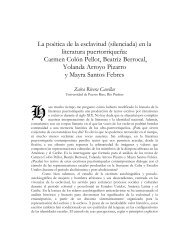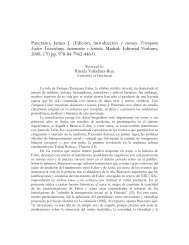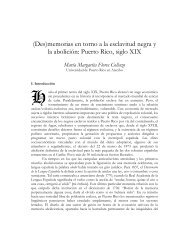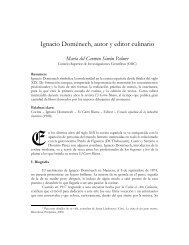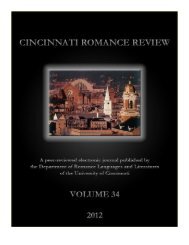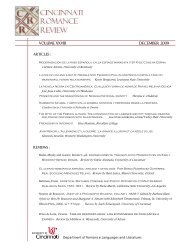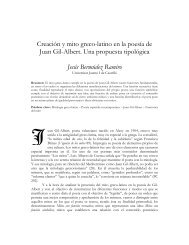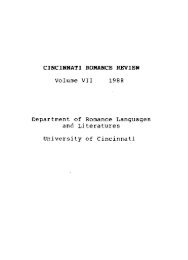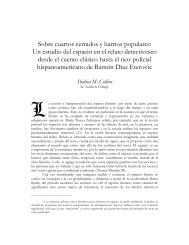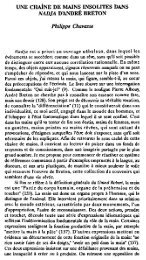INSCRIPTIONS OF DANTE'S BEATRICE IN GERMAINE DE ...
INSCRIPTIONS OF DANTE'S BEATRICE IN GERMAINE DE ...
INSCRIPTIONS OF DANTE'S BEATRICE IN GERMAINE DE ...
You also want an ePaper? Increase the reach of your titles
YUMPU automatically turns print PDFs into web optimized ePapers that Google loves.
38 Inscriptions of Beatrice in Corimw<br />
suo modo sereno") (Divine Comedy 3: 80, 3: 88). Thus Beatrice, the<br />
grace and wisdom of Gall. is also the active and contemplative life<br />
joined into one, a unity which Dante had learned from his great ma..,ter<br />
Aristotle and which his divine Beatrice also endorses.<br />
Germaine de Slael. on the other hand, attacks the politics ofempire.<br />
A monarchist whose father, Jacques Necker, served as financial minister<br />
in the government of Louis XVI, Stae] despised the Revolution and the<br />
usurper Bonaparte, who named himself emperor in PW4 and king of<br />
Italy in 1805. In Considerations, Stae] compares the Reign of Terror<br />
to Dante's Hell, each circle of torment being worse than the one that<br />
preceded it. First the nobles, then th~ priests, then talent, beauty. and<br />
goodness wer~ destroyed, she says «(Euvre.... posthllmes I]g). Then after<br />
the Terror came Napoleon, who-she elaims in Dix annees d'exilcommitted<br />
mOTe acts of arbitrary insolence ~very day of his life than<br />
any monarch of Europe would commit in a year «(Ellvre5 posthumes<br />
363). She concedes that the whole radical experiment once bathed in<br />
blood should be permitted to run its course-too great a price having<br />
been paid for the nation to tum back. She still maintains, though, that<br />
it is monarchy, not republicanism, that developed the French national<br />
character and that it is the system that the French most desire. Yet inDe<br />
fa fittera!lfre she asserts that only in free states can both genius ofaction<br />
and ofreflection be achieved ((Euvres compft~'es 2: 232, 28g-300).<br />
Stad was fascinated with th~ history ofcivilizations and the theory<br />
ofnational character. She saw modem history as having evolved in thr~e<br />
stages: feudalism marked by imoads of the bourgeoisie, the modern<br />
era despotisms, and the representative forms of government that she<br />
observed in England and in the new American democracy. Because different<br />
countries have evolved under different politi\.:al systems and in<br />
different social and religious climat~s, Stae] notes that ditferent national<br />
characters result. As demonstrat~d in Nelvil's conscience, the English<br />
character is open, patriotic. and dutiful, although rational and rigid.<br />
and-in its attitude toward women--,,-unenlighten~d.Under a monarchy<br />
and in the milieu ofthe Court, the French have developed wit, sophistication,<br />
and urbanity. Corinne explains that the Italians are without pride,



